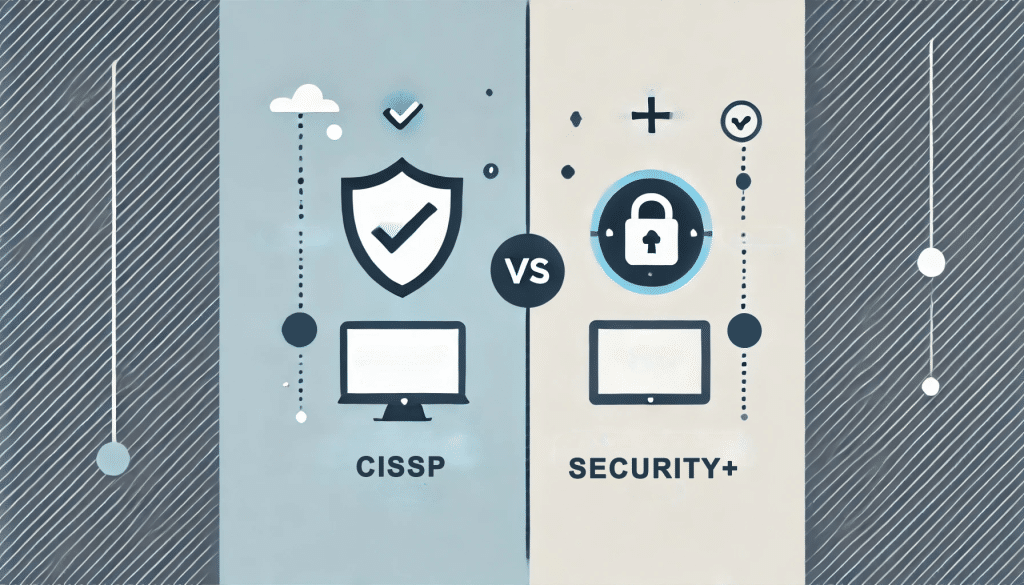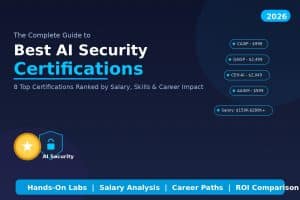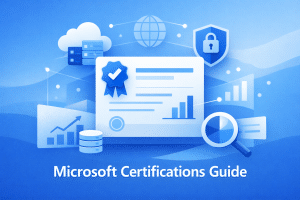Choosing the right serious cybersecurity program or certification can feel overwhelming, especially when you’re torn between heavyweights like CISSP and Security+. Both have solid reputations and can unlock exciting career opportunities, but they cater to different skill levels and career goals.
In 2026, as cybersecurity threats evolve, the demand for certified professionals is skyrocketing. Whether you’re just starting out or looking to level up, understanding how these two certifications differ is key to making the best choice.
Let’s dive in and see which path fits your goals and ambitions better!
Comparison Overview!
| Aspect | CISSP | Security+ |
| Certification Body | (ISC)² | CompTIA |
| Target Audience | Mid-level to senior security professionals | Entry-level to early-career IT/security professionals |
| Focus Area | Broad, managerial, and strategic focus on information security | Fundamental IT security concepts and practices |
| Prerequisites | Minimum 5 years of paid work experience in at least 2 of the 8 CISSP domains (can waive 1 year with a degree or certification) | No prerequisites, but CompTIA recommends 2 years of IT experience |
| Domains Covered | Security and Risk Management, Asset Security, Security Architecture and Engineering, Communication and Network Security, Identity and Access Management, Security Assessment and Testing, Security Operations, Software Development Security | Threats, attacks, and vulnerabilities; architecture and design; implementation; operations and incident response; governance, risk, and compliance |
| Exam Format | 125-175 questions; Computer Adaptive Testing (CAT); 3 hours | 90 questions (multiple choice and performance-based); 90 minutes |
| Difficulty Level | High, designed for experienced professionals | Moderate, suitable for those starting in security |
| Cost | $849 (exam only) | $392 (exam only) |
| Renewal Requirements | Earn 120 CPE credits every 3 years; annual maintenance fee required | Earn 50 CEUs every 3 years; renewal fee required |
| Job Roles | Information Security Manager, Security Architect, Chief Information Security Officer (CISO), Security Consultant | Security Analyst, Junior Penetration Tester, IT Auditor, Systems Administrator |
| Salary Impact | Higher earning potential, often leads to senior or managerial roles | Entry-level and junior roles; provides foundational career growth |
| Industry Recognition | Globally recognized as a gold standard for security management certifications | Well-known for foundational IT and cybersecurity skills |
| Time Investment | Significant study time (6-12 months typical for preparation) | Moderate study time (2-4 months typical for preparation) |
| Use Cases | Designing, managing, and overseeing enterprise-level security programs | Implementing and maintaining security measures in smaller or less complex environments |
| Who Should Pursue? | Professionals aiming for leadership, strategy, and in-depth technical expertise in security | Individuals starting their cybersecurity careers or looking to solidify foundational knowledge |
Why Cybersecurity Certifications Are a Game-Changer
Cybersecurity isn’t just about stopping hackers; it’s about safeguarding the systems that keep our world running. From protecting financial data to securing healthcare systems, professionals in this field are at the front line of defense. But to stand out and prove your skills, having the right certification is almost like having a key to the door of opportunity.
That’s where CISSP and Security+ come in. These certs aren’t just pieces of paper, they’re validations of your knowledge and expertise. They show employers you’ve got what it takes to handle the challenges in this fast-moving industry.
But what makes them worth it, and why do they matter in 2026? Let’s break it down.
Why Certifications Are Critical for Career Growth
Certifications do more than look good on your résumé. They show potential employers you’ve met industry standards and are ready to take on the tasks at hand. Think about it would you trust a doctor without a medical degree? The same logic applies to job opportunities here.
In cybersecurity, where stakes are high, certs build credibility. They demonstrate that you know how to handle attacks, prevent breaches, and recover data when things go wrong. Employers love this kind of proof because they can’t afford to gamble on someone who might know what they’re doing.
CISSP and Security+: The Standout Choices
CISSP and Security+ are like the headline acts in a market flooded with security certifications. Each serves a different crowd, but both are widely respected. Here’s what makes them unique:
- CISSP is for the pros. If you’ve been in the game for a while and are aiming for senior roles, this cert shows you can think big-picture. It’s not about just fixing a problem but managing risks and strategies.
- Security+ is more of a starting point. It’s like your ticket into the cybersecurity club. Covering the basics, it’s perfect for beginners or those pivoting into the field.
Why These Two Certifications Matter in 2026
The cybersecurity industry doesn’t stand still. With each passing year, threats get trickier, and businesses need professionals who can stay ahead. Employers in 2026 aren’t just looking for people with random IT skills; they want experts with certifications that reflect the current landscape.
That’s why CISSP and Security+ stay relevant. They’re not static certifications—they evolve to match the industry’s needs. For example, the Security+ SY0-701 update ensures that the cert reflects modern-day and security practices and challenges, making it a valuable addition to anyone’s toolkit.
CISSP Certification: The Gold Standard for Seasoned Cybersecurity Pros
The Certified Information Systems Security Professional (CISSP) isn’t just another certification; it’s a career-defining milestone for experienced cybersecurity professionals and experts. If you’ve spent a few years in the field and are looking to move into senior roles, CISSP might be the next logical step. Known for its rigorous standards and broad scope, CISSP is recognized globally as a benchmark for excellence in information security.
If you’re also comparing CISSP with other advanced-level options, see our CISSP vs CASP Comparison 2026 for how CISSP stacks up against another CompTIA expert-level certification.
Who Should Consider CISSP?
CISSP isn’t a beginner-friendly for advanced certifications. It’s aimed at experienced professionals who already understand the basics of cybersecurity and want to take on more strategic, managerial roles. Think of it as levelling from technical tasks to designing and managing enterprise-wide security programs.
Here’s a quick snapshot of who benefits the most:
- Security analysts and consultants aiming for leadership positions.
- IT managers who need a deeper understanding of risk management.
- Professionals looking to specialize in governance, risk, and compliance.
The eligibility criteria reflect this focus on experience you’ll need at least five years of work in at least two domains of cybersecurity (more on these domains below).
A Look Inside the CISSP Curriculum
CISSP’s syllabus covers eight domains of cybersecurity, each representing a critical area of expertise. These aren’t just technical; they combine theory, application, and strategy. Let’s break them down:
Security and Risk Management
- Covers risk assessment, governance, and ethics.
- Focuses on aligning security strategies with business goals.
Asset Security
- Deals with managing and protecting organizational assets.
- Includes data classification, retention, and ownership.
Security Architecture and Engineering
- Involves designing secure systems and using encryption effectively.
- A heavy focus on frameworks like ISO 27001 and 27002.
Communication and Network Security
- Explores secure design and implementation of networks.
- Includes protocols, firewalls, and VPNs.
Identity and Access Management (IAM)
- Focused on controlling and managing access to resources.
- Emphasizes multifactor authentication and single sign-on (SSO).
Security Assessment and Testing
- Teaches how to evaluate the effectiveness of security programs.
- Includes vulnerability assessments and penetration testing.
Security Operations
- Revolves around monitoring, logging, and responding to incidents.
- Includes disaster recovery and business continuity planning.
Software Development Security
- Focuses on secure software design and coding practices.
- Includes the Software Development Life Cycle (SDLC).
Why CISSP Holds Its Value in 2026?
CISSP has been around for years but continues evolving with industry needs. Here’s why it’s still one of the most sought-after certifications:
- Global Recognition: Employers across industries know and respect CISSP. Whether you’re in finance, healthcare, or government, this cert signals expertise.
- Broad Skill Set: The eight domains cover everything from technical details to high-level strategy, making CISSP versatile for multiple roles.
- Focus on Leadership: Unlike entry-level certifications, CISSP prepares you for decision-making positions. It’s about fixing problems and managing teams and resources to prevent them.
In 2026, where cybersecurity risks are more diverse than ever, having a CISSP cert means you’re equipped to tackle challenges requiring technical know-how and big-picture thinking.
Where does CISSP Make a Difference?
Jobs requiring CISSP typically come with high stakes and high rewards. It’s a go-to cert for roles like:
- Chief Information Security Officer (CISO)
- Security Architect
- Information Security Manager
- IT Director
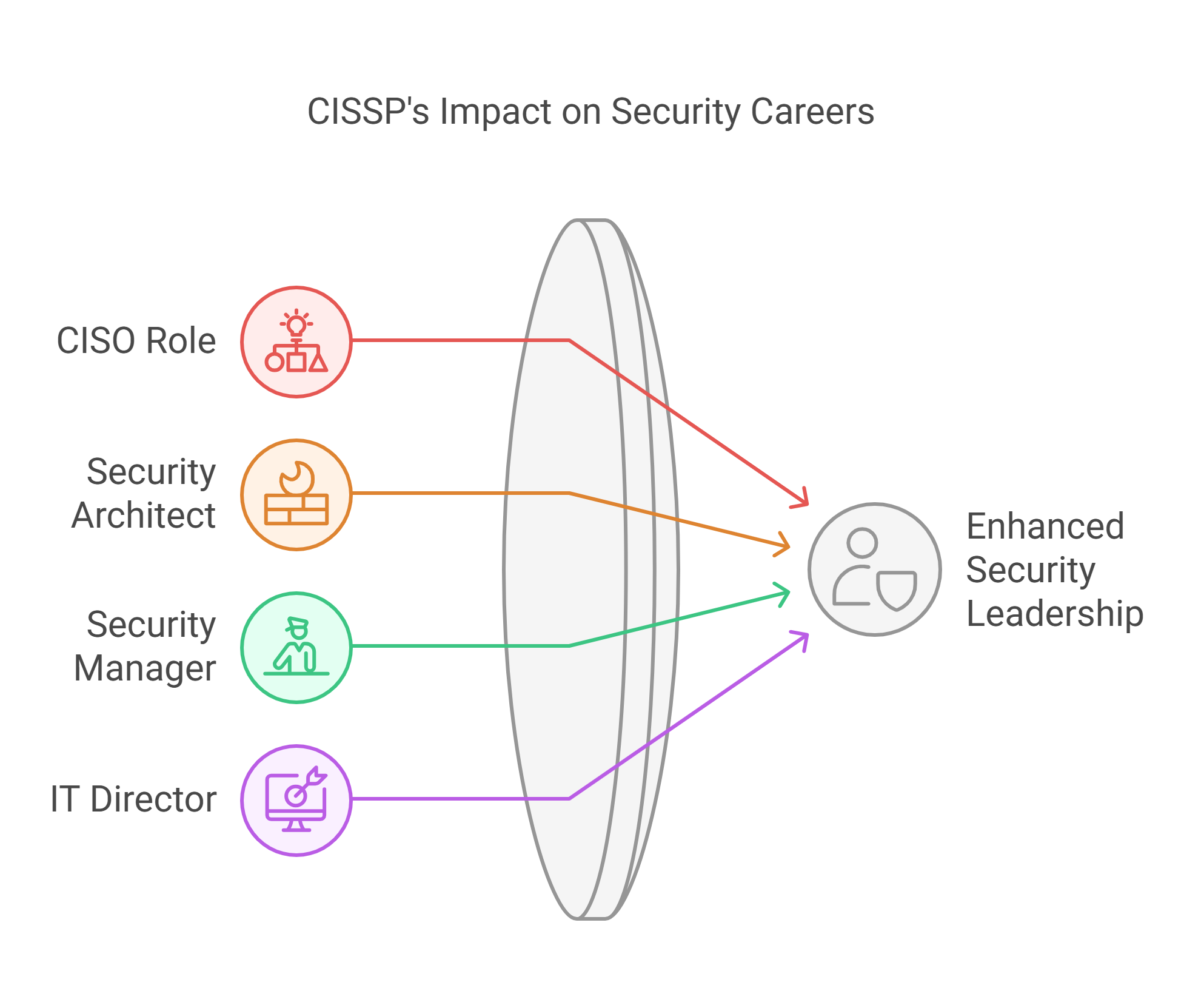
Industries, where CISSP shines, include:
- Finance: Securing payment systems and sensitive customer data.
- Healthcare: Protecting electronic medical records (EMRs) and complying with HIPAA.
- Government: Managing classified information and national cybersecurity defenses.
Security+ (SY0-701): The Starting Point for Cybersecurity Careers
If you’re just stepping into cybersecurity or looking for a solid foundation, Security+ is a great place to start. Offered by CompTIA, this first certification exam is widely recognized for building essential skills that help you land entry-level jobs in IT and security. With the release of the updated SY0-701 exam in 2026, Security+ remains a relevant, practical, and trusted credential for anyone breaking into the industry.
What’s New in the SY0-701 Update?
Every few years, CompTIA updates its certifications to keep up with industry demands, and SY0-701 is no exception. The latest version is designed to cover emerging threats and reflect modern cybersecurity practices. Here’s what’s different:
Focus on Cloud and Virtualization Security
- Cloud computing continues to dominate IT infrastructure, so the new exam emphasizes securing cloud environments.
Updated Threat Analysis Techniques
- With cyberattacks becoming more sophisticated, SY0-701 introduces advanced threat detection and mitigation strategies.
Greater Emphasis on Governance and Compliance
- Includes sections on regulations like GDPR and HIPAA, making the cert relevant for businesses worldwide.
Enhanced Tools and Technologies
- The latest version highlights new tools for monitoring, risk assessment, and endpoint security, ensuring you’re familiar with what’s being used in the field today.
These updates ensure that Security+ reflects real-world scenarios, preparing you for challenges you’ll encounter on the job.
Core Skills and Knowledge You’ll Gain with Security+
Security+ is practical and hands-on, making it ideal for beginners. Here’s what you’ll learn:
- Threats, Attacks, and Vulnerabilities
- Understanding malware, ransomware, phishing, and other attacks.
- How to analyze risks and respond effectively.
- Technologies and Tools
- Knowledge of firewalls, intrusion detection systems (IDS), and encryption tools.
- Hands-on experience with monitoring tools and security applications.
- Architecture and Design
- Basics of network architecture and secure system design.
- Familiarity with cloud architecture and security implementation.
- Identity and Access Management (IAM)
- Managing user permissions and access controls.
- Understanding multifactor authentication and secure login protocols.
- Risk Management
- Learning to identify risks and implement mitigation strategies.
- Conducting risk assessments and adhering to compliance standards.
- Cryptography and PKI
- Basics of encryption, hashing, and secure key management.
- How cryptography secures data in transit and at rest.
Career Opportunities Security+ Opens Up
Earning your Security+ certification can open doors to a wide range of entry-level jobs. Employers value it because it validates the foundational knowledge and skills needed to secure networks, identify vulnerabilities, and respond to incidents. Here are some roles you can target:
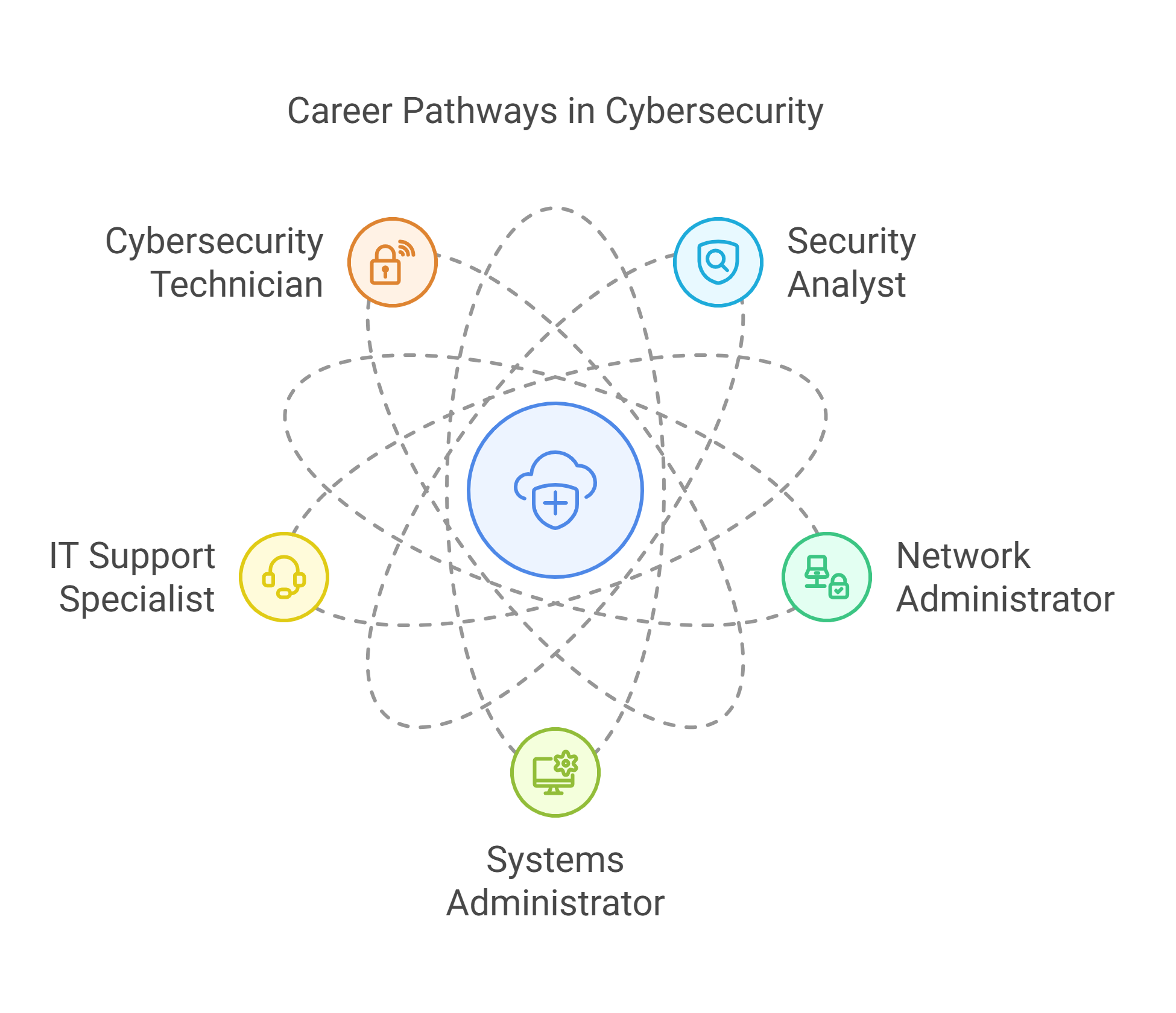
- Security Analyst
- Network Administrator
- Systems Administrator
- IT Support Specialist
- Cybersecurity Technician
Many of these positions are stepping stones to more advanced roles. For example, starting as a a security consultant or analyst with Security+ can eventually lead to earning a CISSP or similar cert as you gain experience.
For those leaning toward governance and leadership paths, our CISSP vs CISM Certification Comparison 2026 explains how CISSP differs from the management-focused CISM.
How Does Security+ Compare to Other Beginner-Level Certifications?
The entry-level certification market has plenty of options, but Security+ stands out for its balance of breadth and practicality. Here’s a quick comparison:
- Security+ vs. Cisco’s CCNA: While CCNA focuses more on networking, Security+ provides a broader introduction to cybersecurity. It’s a better fit if you’re aiming for security-specific roles.
- Security+ vs. Certified Ethical Hacker (CEH): CEH is more specialized, diving into penetration testing. Security+ is better for those just starting and wanting a wider foundation.
- Security+ vs. Microsoft SC-900: Microsoft’s SC-900 covers cloud security basics but lacks the comprehensive scope of Security+.
Security+ remains a favorite among hiring managers because it’s vendor-neutral and covers all the essential topics, making it adaptable to various industries and job roles.
Why Security+ Remains Essential in 2026
The cybersecurity job market is booming, and employers need people who can hit the ground running. Security+ proves you have the practical skills to tackle real-world problems, even if you’re new to the field. With the SY0-701 update aligning with current trends, it’s one of the smartest investments you can make to launch your cybersecurity career.
Which Certification Fits Your Career Goals?
| Criteria | CISSP | Security+ |
| Target Audience | Experienced professionals in senior roles. | Beginners or career changers entering cybersecurity. |
| Purpose | Managing enterprise-level security programs. | Gaining foundational cybersecurity knowledge. |
| Focus | Strategic, managerial, and advanced technical skills. | Practical, hands-on skills for entry-level roles. |
| Relevance | Leadership and specialized positions. | Proves baseline competency in cybersecurity. |
Salary Insights: CISSP vs. Security+ in 2026
Earning potential is one of the biggest motivators for pursuing a certification. CISSP and Security+ both impact salaries, but their influence depends heavily on your experience, role, and industry. Let’s break down how these certifications stack up financially.
Salary Data for CISSP Holders in 2026
Professionals with a CISSP certification are among the highest earners in the cybersecurity field. Here’s why:
- Advanced Expertise: CISSP-certified professionals are skilled in strategy, risk management, and enterprise-level security, which employers highly value.
- Leadership Roles: CISSP is often a requirement for senior and executive positions, which naturally come with higher pay.
Top-paying job roles for CISSP holders:
- Chief Information Security Officer (CISO): $180,000+
- Security Architect: $140,000+
- Information Security Manager: $120,000+
Exam Formats: What to Expect from CISSP and Security+
The exam format plays a significant role in how you approach certification preparation. While both CISSP and Security+ are designed to test your cybersecurity knowledge, their formats, exam difficulty levels, and preparation strategies are entirely different. Let’s break it down.
CISSP’s Adaptive Format: A Test of Strategy and Endurance
The CISSP exam uses a Computerized Adaptive Testing (CAT) format, which means the questions adjust in difficulty based on your performance. This format ensures that the exam zeroes in on your true competency level.
Key Features of the CISSP Exam:
- Number of Questions: 125–175 questions.
- Time Limit: 4 hours.
- Question Types:
- Primarily multiple-choice.
- Some advanced drag-and-drop and hotspot questions.
- Scoring: The CAT system evaluates your answers in real time. As you answer correctly, the questions become harder, and vice versa.
Challenges of the Adaptive Format:
- Pressure to Perform: The harder the questions get, the more mentally draining the exam becomes.
- Time Management: With varying difficulty levels, pacing yourself is critical to avoid running out of time.
- Broad Syllabus: The CISSP exam covers eight diverse domains, requiring mastery of both technical and managerial concepts.
Security+ Exam Format: Simpler but Comprehensive
The Security+ (SY0-701) exam, in contrast, follows a traditional format, making it more straightforward but still challenging for beginners.
Key Features of the Security+ Exam:
- Number of Questions: Up to 90 questions.
- Time Limit: 90 minutes.
- Question Types:
- Multiple-choice.
- Performance-based questions (PBQs) that simulate real-world scenarios, such as configuring a firewall or analyzing a threat.
- Scoring: A passing score is 750 out of 900.
Challenges of the Security+ Exam:
- PBQs: These are hands-on tasks that test your practical skills, adding a layer of complexity to the otherwise theory-heavy format.
- Time Constraint: With just 90 minutes, managing your time effectively is crucial.
- Foundational Coverage: Although it’s an entry-level exam, it covers a wide range of topics, from network security to cryptography.
Preparation Strategies for CISSP and Security+
CISSP Preparation: Time, Resources, and Focus
- Recommended Study Time: 4–6 months for experienced professionals.
- Study Materials:
- Official CISSP Study Guide.
- Practice exams that simulate the CAT format.
- Online training courses or bootcamps for in-depth domain coverage.
- Focus Areas:
- Prioritize weak domains (e.g., Security Operations or Risk Management).
- Practice time management during mock tests.
- Pro Tips:
- Understand the CAT system; it rewards consistent performance.
- Develop mental stamina to handle the 4-hour exam.
Preparing for the CISSP exam requires a strategic approach to studying and mastering key domains. For a step-by-step guide to ace the exam, explore proven preparation strategies and expert tips to achieve CISSP success
Security+ Preparation: A Practical Approach for Beginners
- Recommended Study Time: 1–2 months for individuals with basic IT knowledge.
- Study Materials:
- CompTIA Security+ Official Study Guide.
- Practice exams, especially those with PBQs.
- Interactive labs for hands-on experience with tools and configurations.
- Focus Areas:
- Master PBQs since they account for a significant portion of the score.
- Spend extra time on tricky topics like cryptography and IAM.
- Pro Tips:
- Use flashcards for memorizing key concepts.
- Take timed practice tests to improve speed and accuracy.
A well-structured study plan can make all the difference in passing the Security+ exam with confidence. For a comprehensive guide covering exam objectives, study tips, and essential resources, check out this detailed resource for aspiring security professionals https://certempire.com/comptia-sy0-701-exam-guide/
Comparison of Exam Formats and Preparation
| Aspect | CISSP | Security+ |
| Format | Computerized Adaptive Testing (CAT). | Multiple-choice and Performance-Based Questions. |
| Duration | 4 hours. | 90 minutes. |
| Question Count | 125–175. | Up to 90. |
| Difficulty | High, requires advanced knowledge and strategy. | Moderate, focuses on foundational skills. |
| Preparation Time | 4–6 months. | 1–2 months. |
| Key Challenge | Adapting to increasing question difficulty. | Managing time and mastering PBQs. |
Which Exam Format Suits You?
- CISSP: Ideal for seasoned professionals who can handle a lengthy, adaptive test that demands strategic thinking.
- Security+: Perfect for beginners looking for a practical exam that tests hands-on skills alongside theoretical knowledge.
Choosing between the two depends on your career stage, experience, and how much time you’re willing to dedicate to preparation.
Final Thoughts: CISSP vs. Security+ in 2026
Choosing between CISSP and Security+ boils down to where you are in your cybersecurity journey and what you aim to achieve.
Security+ is the perfect starting point for beginners, offering practical skills to launch a career in IT or cybersecurity. On the other hand, CISSP is the ultimate milestone for experienced professionals ready to take on leadership roles and handle complex security challenges. Both certifications serve distinct purposes, adding tremendous value to your career.
Whether you are building a foundation of advanced security knowledge or climbing to the top, these certs pave the way for success in 2026’s competitive cybersecurity landscape. Cert Empire can help you with the best exam dumps for acing these certifications.
Frequently Asked Questions About CISSP and Security+
Is Security+ enough to start a career in cybersecurity in 2026?
Security+ is an excellent entry point for beginners, providing foundational skills to land roles like IT support, network administrator, or even security engineer or analyst.
How does CISSP’s difficulty compare to Security+?
CISSP is significantly harder, requiring advanced knowledge, strategic thinking, and experience, while Security+ focuses on basic, practical cybersecurity advanced security concepts.
Can Security+ lead directly to high-paying jobs?
Security+ can secure for entry level positions top-level roles with competitive salaries, but higher-paying positions typically require additional certifications or experience.
Do employers value CISSP over Security+ for senior roles?
CISSP is highly valued for senior and leadership positions, as it validates advanced expertise and strategic capabilities.
How long does it take to prepare for each certification?
Preparation for Security+ takes 1–2 months for beginners, while CISSP may require 4–6 months for professionals with relevant experience.

